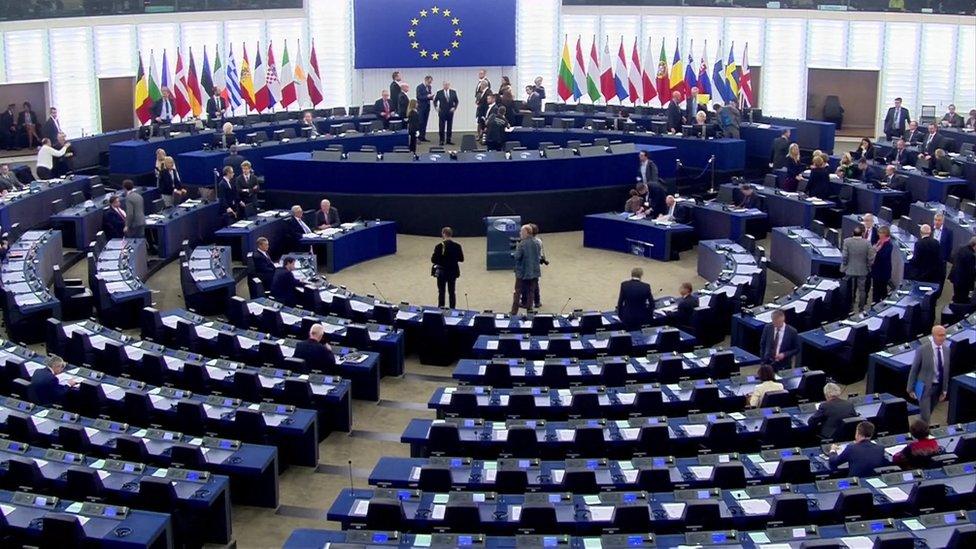Brexit: MEPs urge delay in trade talks decision
- Published
- comments

MEPs have voted to urge the EU not to open the next phase of Brexit talks unless there is a "major breakthrough".
A motion in the European Parliament to back a delay in any decision over trade discussions was backed by 557 MEPs, with 92 against and 29 abstentions.
Several MEPs claimed UK divisions were hampering the process with one urging Theresa May urged to "put Britain first" and avoid internal "quarrels".
But UKIP's Nigel Farage accused the EU of "treating the UK like a hostage".
Tuesday's vote in Strasbourg was not binding, but does represent a chance to "take the political temperature", BBC Brussels reporter Adam Fleming said.
The UK government insists there is a new dynamic in the negotiations since Mrs May's Florence speech last month and "real momentum" behind the process.
The European Parliament, home to 751 MEPs from across the EU, has no formal role in the Brexit negotiations - but will get to approve any final deal agreed between the UK and Brussels.
As the debate opened, a number of MEPs drew attention to what they claimed were divisions in the Conservative government and Mrs May's cabinet over the terms of exit.
Manfred Weber, a German member of the European People's Party grouping, said: "Who do I call in London - Theresa May, Boris Johnson or David Davis? Please don't put your party first.
"We need a clear answer who is responsible for the British position," he added.
Guy Verhofstadt, who leads the Liberal ALDE group and is also the Parliament's chief Brexit spokesman, said he "deplores" the lack of progress so far, blaming open splits among leading British ministers.
"There are differences between Hammond and Fox... and Johnson and May."
From last week: David Davis and Michel Barnier on the state of talks
He also criticised the UK's proposals for creating a new "settled status" for EU citizens after Brexit - which he said would cause a "huge administrative burden" for those affected.
Addressing the meeting, EU negotiator Michel Barnier suggested there has not been "sufficient progress" in Brexit talks yet to open trade discussions despite Mrs May's speech which "gave us some openings which are starting to be reflected in the negotiations".
MEPs will vote later on a motion saying the UK's approach to financial issues has "seriously impeded" progress, a motion the UK said was drafted before the most recent round of negotiations.
Mr Farage, a key figure in the campaign to leave the EU which won last year's referendum, accused the EU of "treating us (the UK) like a hostage".
"Unless we pay a ransom and meet your demands you won't have an intelligent conversation with us about trade... and no guarantee when we meet your demands you will come to us and have a sensible trade agreement," he said.
The UK is keen to start talking about what kind of trading relationship it will have with the EU after Brexit but it looks increasingly unlikely EU leaders will agree to this when they meet next month.
Citizen rights
The EU says this can only happen when the European Council decides there has been "sufficient progress" on three issues: the so-called divorce bill when the UK leaves, the rights for EU citizens in the UK and UK citizens in the EU and the Northern Ireland border.
On citizens' rights, the two sides cannot agree on whether UK or EU courts will guarantee European nationals' rights in the UK after Brexit.
The motion - which has been proposed by the main political groupings so is likely to be passed - calls for "reciprocity, equity, symmetry and non-discrimination".
And on another sticking point, the amount of money the UK will pay as it leaves the EU, it says "substantial progress in that area is required before entering into discussions on other issues".
Speaking earlier, Mrs May said her Florence speech had "changed the dial" in the negotiations and European leaders were clear where the UK stood and who was in charge.